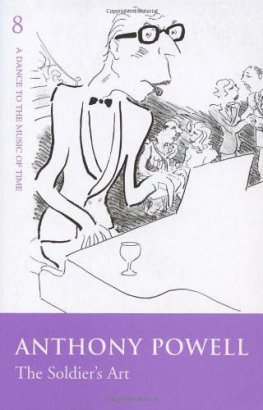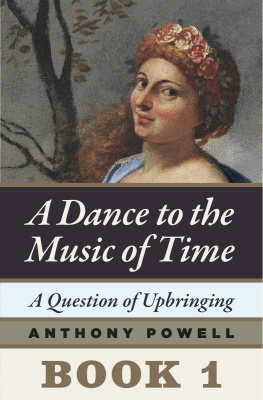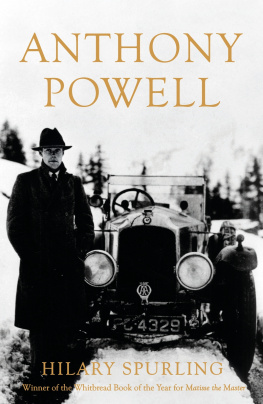Anthony Powell - Books Do Furnish a Room
Here you can read online Anthony Powell - Books Do Furnish a Room full text of the book (entire story) in english for free. Download pdf and epub, get meaning, cover and reviews about this ebook. genre: Prose. Description of the work, (preface) as well as reviews are available. Best literature library LitArk.com created for fans of good reading and offers a wide selection of genres:
Romance novel
Science fiction
Adventure
Detective
Science
History
Home and family
Prose
Art
Politics
Computer
Non-fiction
Religion
Business
Children
Humor
Choose a favorite category and find really read worthwhile books. Enjoy immersion in the world of imagination, feel the emotions of the characters or learn something new for yourself, make an fascinating discovery.

- Book:
- Author:
- Genre:
- Rating:5 / 5
- Favourites:Add to favourites
- Your mark:
- 100
- 1
- 2
- 3
- 4
- 5
: summary, description and annotation
We offer to read an annotation, description, summary or preface (depends on what the author of the book "" wrote himself). If you haven't found the necessary information about the book — write in the comments, we will try to find it.
— read online for free the complete book (whole text) full work
Below is the text of the book, divided by pages. System saving the place of the last page read, allows you to conveniently read the book "" online for free, without having to search again every time where you left off. Put a bookmark, and you can go to the page where you finished reading at any time.
Font size:
Interval:
Bookmark:
Anthony Powell
A Question of Upbringing
1
Reverting to the university at forty, one immediately recaptured all the crushing melancholy of the undergraduate condition. As the train drew up at the platform, before the local climate had time to impair health, academic contacts disturb the spirit, a more imminent gloom was re-established, its sinewy grip in a flash making one young again. Depressive symptoms, menacing in all haunts of youth, were in any case easily aroused at this period, to be accepted as delayed action of the last six years. The odd thing was how distant the recent past had also become, the army now as stylized in the mind to compare another triumphal frieze as the legionaries of Trajans Column, exercising, sacrificing, sweating at their antique fatigue, silent files on eternal parade to soundless military music. Nevertheless, shades from those days still walked abroad. Only a week before, the peak of a French generals khaki kepi, breaking rather too abruptly through the winter haze of Piccadilly, had by conditioned reflex jerked my right hand from its overcoat pocket in preparation for a no longer consonant salute, counterfeiting the gesture of a deserter who has all but given himself away. A residuum of the experience was inevitable.
Meanwhile, traditional textures of existence were laboriously patched together in an attempt to reaffirm some sort of personal identity, however blurred. Even if as some thought the let-up were merely temporary, it was no less welcome, though the mood after the earlier conflict summarized by a snatch Ted Jeavons liked to hum when in poor form was altogether absent:
Aprs la guerre,
Therell be a good time everywhere.
That did not hinder looking forward to engrossment during the next few weeks amongst certain letters and papers deposited in the libraries here. Solitude would be a luxury after the congestions of wartime, archaic folios a soothing drug. War left, on the one hand, a passionate desire to tackle a lot of work: on the other, never to do any work again. It was a state of mind Robert Burton about whom I was writing a book would have well understood. Irresolution appealed to him as one of the myriad forms of Melancholy, although he was, of course, concerned in the main with no mere temporary depression or fidgetiness, but a chronic or continued disease, a settled humour. Still, post-war melancholy might have rated a short sub-section in the great work:
THE ANATOMY OF MELANCHOLY
What it is, with all the Kindes, Causes, Symptomes, Prognostickes, and severall cures of it. Three Maine Partitions with their severall Sections, Members and Sub-sections, Philosophically, Medicinally, Historically, Opened and cut up by Democritus Junior. With a Satyricall Preface, conducing to the following Discourse. Anno Dom. 1621.
The title page showed not only Burtons own portrait in ruff and skull cap, but also figures illustrative of his theme; love-madness; hypochondriasis; religious melancholy. The emblems of jealousy and solitude were there too, together with those sovereign cures for melancholy and madness, borage and hellebore. Burton had long been a favourite of mine. A study of him would be a change from writing novels. The book was to be called Borage and Hellebore.
As the forlorn purlieus of the railway-station end of the town gave place to colleges, reverie, banal if you like, though eminently Burtonesque, turned towards the relatively high proportion of persons known pretty well at an earlier stage of life, both here and elsewhere, now dead, gone off their rocker, withdrawn into states of existence they or I had no wish to share. The probability was that even without cosmic upheaval some kind of reshuffle has to take place halfway through life, a proposition borne out by the autobiographies arriving thick and fast three or four at a time at regular intervals for review in one of the weeklies. At this very moment my bag was weighed down by several of these volumes, to be dealt with in time off from the seventeenth century: Purged Not in Lethe A Stockbroker in Sandals Slow on the Feather Moss off a Rolling Stone chronicles of somebody or others individual fate, on the whole unenthralling enough, except insomuch as every individuals story has its enthralling aspect, though the essential pivot was usually omitted or obscured by most autobiographers.
However, nearly all revealed, if not explicitly in every case, a similar reorientation towards the sixth climacteric, their narrative supporting, on the whole, evidence already noticeably piling up, that friends, if required at all in the manner of the past, must largely be reassembled at about this milestone. The changeover might improve consistency, even quality, but certainly lost in intimacy; anyway that peculiar kind of intimacy that is consoling when you are young, though probably too vulnerable to withstand the ever increasing self-regard of later years.
Accommodation was in college. The place looked much the same as ever. Only one porter, his face unfamiliar, was on duty at the lodge. After studying a list for a long time, he signified a distant staircase for the rooms allotted. The traditional atmosphere, tenuously poised between a laxly run boarding-school and seedy residential club, now leant more emphatically towards the former type of institution. The rooms, arctic as of old, evidently belonged to a fairly austere young man, whose only picture was an unframed photograph of a hockey team. It stood curling on the mantelpiece. In the bookcase, a lot of works on economics terminated with St John Clarkes Dust Thou Art, rather a recondite one about the French Revolution, which might be pleasurable to reassess critically. I pushed on into the bedroom. Here a crisis declared itself. The bed was unmade. Only a sombrely stained blue-grey mattress, folded in three, lay on the rusty wires of the frame. Back at the porters lodge, the inconceivable difficulties of remedying lack of bedclothes at this hour were radically discussed. Later, in hall, a few zombie-like figures collected together to consume a suitably zombie-sustaining repast.
This was the opening of a routine of days in the library, nights collating notes, the monotony anodyne. One became immediately assimilated with other dim, disembodied, unapproachable entities, each intent on his own enigmatic preoption, who flit through the cobbled lanes and gothic archways of a university in vacation. It was what Burton himself called a silent, sedentary, solitary private life, and it well suited me during the middle of the week. For weekends, I returned to London. Once Killick, a hearty rugby-playing philosophy don of my college, now grunting and purple, came bustling up the street, a pile of books under his arm, and I accosted him. There were explanations. Killick issued an abstracted invitation to dinner. The following week, when I turned up, it was to be told Professor Killick had gone to Manchester to give two lectures. This oversight hardly came as a surprise. In a city of shadows, appointments were bound to be kept in a shadowy fashion.
At the same time something very different, something perfectly substantial, not shadowy at all, lay ahead as not to be too long postponed, even if a latent unwillingness to face that fact might delay taking the plunge. A moral reckoning had to be discharged. As the days passed, the hypnotic pull to pay a call on Sillery grew increasingly strong, disinclination that was, of course, far too strong a word, indeed not the right word at all scarcely lessening, so much as the Sillery magnetism itself gathering force. Pretendedly heedless enquiries revealed that, although retired for some time from all administrative duties in his own college, Sillery still retained his old rooms, receiving visitors willingly, even avidly, it was reported, with so far as possible the traditional elements of welcome.
Font size:
Interval:
Bookmark:
Similar books «»
Look at similar books to . We have selected literature similar in name and meaning in the hope of providing readers with more options to find new, interesting, not yet read works.
Discussion, reviews of the book and just readers' own opinions. Leave your comments, write what you think about the work, its meaning or the main characters. Specify what exactly you liked and what you didn't like, and why you think so.






